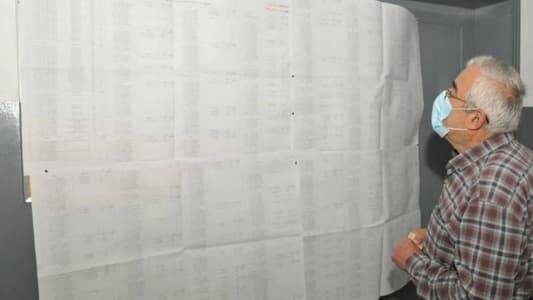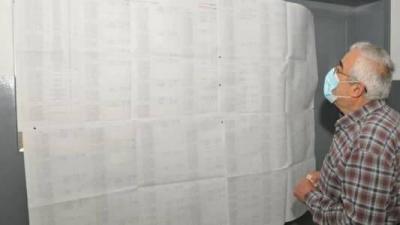The burden of extending municipal councils for months, potentially up to a year, looms large, highlighting the absence of a democratic cycle and imprisoning political parties, clans, and families to prevent elections, which further widens the vacuum in the crumbling state. Rumors of extending the municipal and discretionary councils, which have been forcibly extended for one year, are circulating, as everyone waits for the final decision to take shape. After caretaker Prime Minister Najib Mikati expressed a preference for presidential elections, parties joined in the chorus, publicly informing their followers, especially in Baalbek-Hermel, that there would be no elections in May. Employees in the civil registry whisper to the heads of municipalities about the futility of correcting names on the voter lists distributed by the Ministry of Interior last month, as elections are postponed.
Political parties and active forces in all towns and villages of the Bekaa have shed the obligation of entering into the negotiations of dividing municipal councils and federations, which were previously a form of appeasement for families, balancing interests among all, and undermining the spirit of developmental work for which local and administrative councils were established. While voices have risen calling for these elections to be treated as an internal family and clan matter under the principle that "those in Mecca know its alleys best," parties continued their involvement in the division negotiations within the extended year, preparing to raise their hands if a second extension is approved, leaving the status quo intact. Most municipalities are struggling under the pressure of bankruptcy and their inability to cover expenses and employee salaries, while these forces financially support most of these municipalities, thus controlling their decisions.
If the extension occurs, and nothing is certain yet as many rely on international pressure and securing the necessary funding for holding elections, it would impose unbearable burdens on municipalities, political forces, and the state. The Ministry of Interior and governors cannot perform municipal tasks if the extension is not legislated in the parliament, rendering them effectively dissolved, as their capabilities in terms of personnel are limited. Managing more than a hundred municipalities, for example, in Baalbek-Hermel is challenging due to the disputes arising among families within villages and towns, in addition to the embarrassment parties would face before their audience, unable to proceed with the elections for narrow considerations related to their fear of losing to those families and the failure of the models they presented within the frameworks of consensus divisions and extensions, along with the corruption allegations that have arisen.
The significant issue resulting from the extension, which will confront both the state and the parties, is that some municipal councils are prepared to resign if the extension occurs to avoid bearing the consequences inevitable with failure, alongside disagreements emerging among families and members of municipal councils over who has the right to assume the presidency and vice-presidency. This situation will inevitably lead them into a state of vacancy, regardless of whether the extension happens or not.
Regarding the legality of the extension and the constitutional interpretation of the situation, constitutional law expert Dr. Jihad Ismail pointed out that "the call for municipal electoral bodies primarily falls to the Minister of Interior, during the two months preceding the end of the municipal councils' term, unlike the call for parliamentary elections that must be organized by decree, not ministerial decision as is the case with municipal elections according to Article 14 of the Municipalities Law. This obligates the caretaker government to secure the necessary allocations for it, either through the 2023 budget draft or through budget reserves on the twelfth rule, or via the passage of a special law in the parliament which can legislate when it is not convened as an electoral body in a session not designated for electing the president, in accordance with Article 75 of the Constitution, and when financing elections through donor entities, the grant is then accepted through a decree issued by the cabinet."
He told "Nidaa Al-Watan": "Any administrative act must be carried out within legal timeframes under the penalty of nullification, compelling the caretaker government to perform it without delay, as conducting municipal elections is a constitutional duty that the presidential vacancy does not prevent. This is necessitated by the right to vote as a constitutional right embodied by Article 7 of the Constitution, which branches out into another constitutional principle, the principle of periodic elections enshrined, in principle, in paragraph ‘b’ of Article 25 of the International Covenant on Civil and Political Rights issued by the United Nations, to which Lebanon acceded in 1972; thus, any postponement of elections is a breach of principles or rules of constitutional value."
If the term of municipal councils expires before a decision to postpone is issued and elections are not conducted simultaneously, Ismail affirms that municipal councils are legally considered non-existent, and consequently, they cannot issue any decisions, meaning that the theory of acting in a caretaker capacity in this regard is not fulfilled due to the absence of explicit legal text conferring such authority unless the parliament legislates a law permitting them to continue before the term's end; otherwise, governors and mayors cannot assume the functions of these councils when it is presumed to be dissolved under the conditions of Article 23 of the Municipalities Law, specifically upon the loss of at least half their members or upon the nullification of their election, not upon the conclusion of their term.




